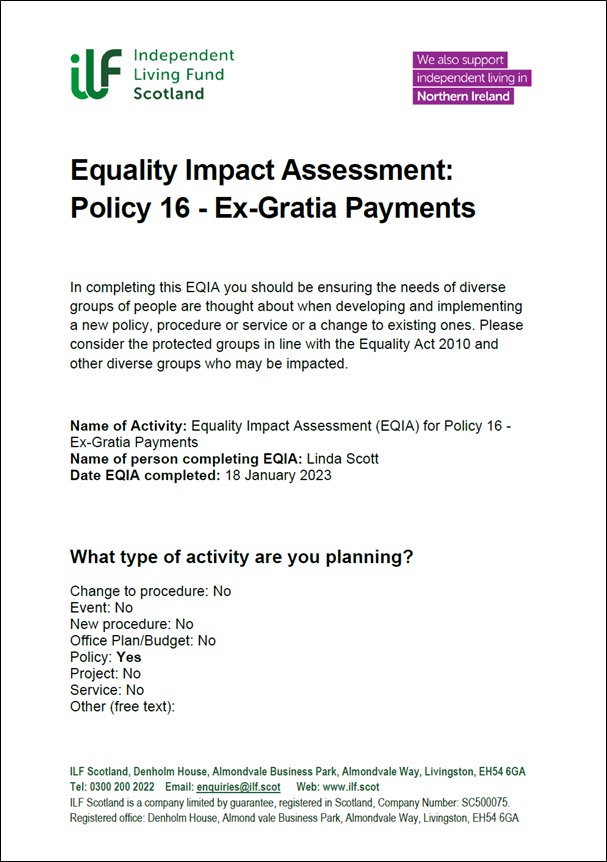
In completing this EQIA you should be ensuring the needs of diverse groups of people are thought about when developing and implementing a new policy, procedure or service or a change to existing ones. Please consider the protected groups in line with the Equality Act 2010 and other diverse groups who may be impacted.
Name of Activity: Equality Impact Assessment (EQIA) for Policy 16 - Ex-Gratia Payments
Name of person completing EQIA: Linda Scott
Date EQIA completed: 18 January 2023
Change to procedure: No
Event: No
New procedure: No
Office Plan/Budget: No
Policy: Yes
Project: No
Service: No
Other (free text):
Review of policy and wording revision.
All 2015 fund recipients.
The protected characteristics to consider are: Age, Disability, Sex, Race, Religion or Belief, Gender Reassignment, Sexual Orientation, Marriage and Civil Partnership, Pregnancy and Maternity. It will also be helpful to consider these groups more widely in relation to their socio-economic status that includes such factors as educational attainment, occupation, income, wealth and social deprivation.
Please mark as Yes or No. If yes use the Comments column to describe what the potential impact is. What are your sources of evidence?
(Try to think about both positive and negative impacts. There are lots of sources of data to help answer this question. Diversity Networks, the Diversity Report or Diversity & Inclusion team may offer some useful information. Previously completed EQIAs may also offer answers to questions you may have).
Age: No
Comments:
Disability: Yes
Comments: By having a policy for engaging care and assistance outside of a recipients normal country of residence, this facilitates choice, control and flexibility should a recipient wish to go on holiday or travel for any other reason. This can increase independence and improve opportunities for new experiences, leisure and to spend time with loved ones, family members or friends who live in another country. The policy also means that there is no restriction placed on recipients to receive support in their usual place of residence, maximising their right to the same equal opportunities as people who are not assessed as needing personal assistance.
Evidence suggests that disabled people are less likely to travel than other people in part due to physical barriers to travelling, but also as a result of the stipulation that statutory assistance is provided at their home or other setting within their residence locality; this policy however reduces those restrictions specific to personal assistance.
Source: Disabled people’s travel behaviour and attitudes to travel (publishing.service.gov.uk)
Gender Reassignment: No
Comments:
Marriage and Civil Partnership: No
Comments:
Pregnancy and Maternity: No
Comments:
Race: No
Comments:
Religion or belief: No
Comments:
Sex: No
Comments:
Sexual orientation: No
Comments:
(For example, carer status, single parent, economic exclusion. It is important not to limit your thinking just to the protected characteristics listed above. This question is broadening the EQIA out to be more inclusive. The impact might be a negative one (e.g. making that decision could decrease the opportunity for some people to participate) or it could be a positive one (e.g. by making that decision, more people are able to take part in the activity).)
Carers: No
Comments:
If there are any gaps in information that make it difficult or impossible to form an opinion on how your policy, service or change might affect different groups of people, please take the time to gather information to help you make an informed answer (for example, review statistics, survey results, complaints analysis, consultation documents, customer feedback, existing briefings submissions or business reports, comparative policies from external sources and other Government Departments etc).
Desk research, consultation with ILFS Assessors, Specialist Caseworkers, Recipients, Award Managers, Scottish Advisory Group, NI Stakeholder Group.
Age: No
Disability: No
Gender Reassignment: No
Marriage and Civil Partnership: No
Pregnancy and Maternity: No
Race: No
Religion or belief: No
Sex: No
Sexual orientation: No
All 2015 Fund recipients – no adverse impact determined.
Age: No
Disability: Yes
Comments: By having a policy for engaging care and assistance outside of a recipients normal country of residence, this facilitates choice, control and flexibility should a recipient wish to go on holiday or travel for any other reason. This can increase independence and improve opportunities for new experiences, leisure and to spend time with loved ones, family members or friends who live in another country. The policy also means that there is no restriction placed on recipients to receive support in their usual place of residence, maximising their right to the same equal opportunities as people who are not assessed as needing personal assistance.
Gender Reassignment: No
Marriage and Civil Partnership: No
Pregnancy and Maternity: No
Race: No
Religion or belief: No
Sex: No
Sexual orientation: No
We will continue to discuss with and inform Recipients / Award Managers of this policy via our website, and contact with our Assessors and Specialist Caseworkers, Scottish Advisory Group and NI Stakeholder Group.
Ongoing monitoring and review of policy impact on Recipients and their Award Manager via feedback from Assessors and Specialist Caseworkers, Management Team, and Senior Management Team. Policy will be signed off by Linda Scott, Director of Policy, Improvement and Engagement.